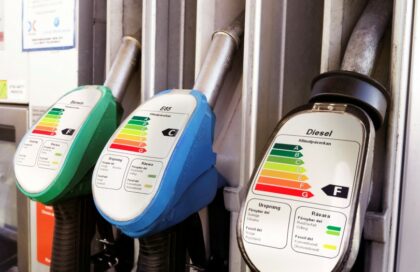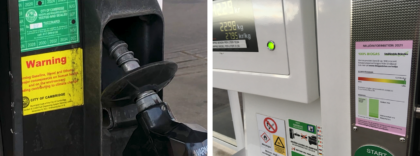In March 2023, the Hawaii Senate passed bill SB506, requiring climate change and health information labels on all gas pumps. However, a House committee later deferred the measure. The decision was odd since five of the seven committee members, including the chair, had co-sponsored the bill themselves. The lawmakers in Hawaii should revive the bill, making Hawaii an example for the world.
In fall 2021, eco-labels with climate impact rating became mandatory on fuel dispensers and charging stations across Sweden. A few months before that, climate and health warning labels were placed on all gas pumps in Cambridge, MA. These are the world’s first labelling schemes of this kind.
Hawaii was on track to become the first U.S. state with mandatory labels like those in Cambridge. On March 7, 2023, the state of Hawaii Senate passed bill SB506 to that effect. This was the result of the work of a few dedicated lawmakers and the advocacy of the Hawaii-based non-profit Think Beyond the Pump.
Local measures, wider consequences
The initiative in Hawaii is significant because warning labels or eco-labels can easily spread to other states and countries, until they get the same global penetration as warnings and health information on cigarette packages.
Then the general attitude may change: to fill our cars with fossil fuels will no longer be normal; it will be suspect – just like smoking. Such an overall shift will in turn trickle down to the local and individual levels, altering the choices of mode of transport made by people in Hawaii and elsewhere.
The ideas are already spreading. Warning labels on gas pumps have been considered in several cities in the U.S. and Canada, as reviewed by Bloomberg. Finland, Great Britain, and Norway have shown interest in Swedish-style eco-labels, and there is some interest at the EU level. Eco-labels at refuelling stations across Europe that specifically show the raw materials and geographic origin of biofuels were adopted by the European Parliament within the framework of the updated Renewable Energy Directive. However, the measure doesn’t seem to have made it through the trilogue, the final round of negotiations in March 2023.
Clearly, the local and global levels juxtapose and intertwine when it comes to climate policy and greenhouse gas emissions. Hawaii and Sweden are as far apart as you get on Earth. Nevertheless, if gas pump labels reduce the use of fossil fuels at all, labels in Hawaii affect the climate in Sweden as much as in Hawaii, and likewise for labels in Sweden.
The Senate Committee on Commerce and Consumer Protection emphasized in its recommendation to pass SB506 that Hawaii is particularly vulnerable to the effects of climate change. The coral reefs are important for tourism, and 40 percent of these could be lost by 2100.
Sweden is sensitive to climate change as well. For example, higher and more volatile temperatures are expected to impair winter grazing for reindeer, threatening the semi-nomadic reindeer herding lifestyle of the Sami people.
International support
The pioneering significance of SB506 is highlighted by the fact that supportive testimony was submitted to the Hawaii Legislature not only from local stakeholders, but from other states and countries. The news that the Hawaii Senate passed SB506 was covered in the BMJ (formerly known as British Medical Journal), one of the world’s oldest and most prestigious medicine journals.
Here are excerpts from the testimonies of some leading climate, health and communication experts, several of whom are lead authors for the IPCC. Longer versions are found here.
These warnings can modify the low public awareness of the health and climate effects from the combustion of conventional transportation fuels. […] We believe this to be an important intervention that will help consumers in the transition towards less carbon-intense transport.
Kristie L. Ebi, Distinguished Professor, Center for Health and the Global Environment, University of Washington, Seattle
Lorraine Whitmarsh, Professor, Director – Centre for Climate Change & Social Transformations (CAST), Department of Psychology, University of Bath
Dr Mike Gill, former Regional Director of Public Health, England
Sir Andrew Haines, Professor of Environmental Change and Public Health, former director of London School of Hygiene & Tropical Medicine
The harms resulting from fossil fuel combustion are not well-understood by consumers of gas but should be since a transition off fossil fuels is required to keep human-caused climate change from having far more damaging consequences than those we are already seeing. Gas pump labels should be essential policy for other states and countries to follow.
Drew Shindell, Distinguished Professor of Climate Sciences in the Earth and Climate Sciences Division at Duke University in Durham, NC
As a public health communication expert, l can testify to the important effect that well-constructed labeling programs can have in shifting consumer preferences. In the case of gasoline and diesel, consumers need and have a right to know science-based information about the immediate health harms and long-term climate harms caused by burning fossil fuels.
Edward Maibach, Distinguished Professor and Director George Mason University Center for Climate Change Communication
I have long studied the power of social norms programs like this one, and the role of behavioral modifications required to create low-carbon transportation. In my view, health-climate labels on gas pumps educating the public at scale have the potential to alter preferences away from gasoline and diesel fuels.
Dan Sperling, Distinguished Professor of Civil Engineering and Environmental Science & Policy, University of California, Davis. Founding Director, Institute of Transportation Studies
[Y]ears of health communication research provides strong evidence that repetition is necessary and important to influence individual’s behavior. Knowledge alone does not prompt action and repeated cues and messages are imperative if we want to motivate people to act. […] Well placed cues and messages are critically important in influencing people’s cognition as well as their behaviors.
Hye-ryeon Lee, Professor, health communication researcher, University of Hawaii at Manoa
Climate warning labels are a timely and urgent way to better inform consumers. Hawaiian legislators have the opportunity to create a new global pathway for consumer protection for others to follow.
USC Schwarzenegger institute
The potential effects of warning labels or eco-labels are analysed in more depth in recent review articles in Global Challenges and Nature Climate Change. It goes without saying that many measures are needed to end the fossil fuel era. Labels are small pieces of the puzzle.
An unfortunate change of mind
When the Hawaii Senate passed SB506, it crossed over to the House. A hearing in the House Committee on Energy & Environmental Protection (EEP) was scheduled for March 21.
In recent years, the EEP chair Nicole Lowen has expressed support for the idea of climate and health warning labels on gas pumps. This year, she had introduced a House version HB1277 of SB506 herself, together with Elle Cochran, the vice chair of EEP, and three more committee members. In all, five of the seven members of EEP were co-sponsors of the gas pump labelling bill.
Therefore, it seemed evident that EEP was going to recommend passing the bill. However, the chair Nicole Lowen instead recommended that the measure be deferred.
The timing of the decision was ironic. The day before the committee hearing, the IPCC released a somber synthesis report. Furthermore, Hawaii was the first state in the U.S. to declare a Climate Emergency. One might therefore think that every measure that has the slightest chance to counteract climate change would be welcomed.
Lowen motivated her decision briefly during the hearing, as follows:
Although I appreciate the intent of this, I’m going to defer this; I feel there are just more important things to work on at this time, and by the logic here we should probably put a label on everything, including, you know, every hamburger, for example. It might be helpful to put a climate warning label on those.
After the hearing, we have asked Lowen and fellow committee members in EEP who introduced the bill to explain why they changed their mind, and to elaborate on the reasons for the deferral.
Lowen has not answered repeated questions. Other members of congress have expressed surprise, or have referred the question back to Lowen, who apparently made the decision herself. No committee report has been published.
If we are taking Lowen’s words at face value, we say fine, why not put climate information labels on hamburgers, but let’s start with the primary source of the man-made greenhouse effect: fossil energy. In Hawaii, fossil fuels used for transportation were responsible for 44 percent of all greenhouse gas emissions in 2017, the most recent figure available to us. In Sweden, the corresponding share was 31 percent in 2021.
Industry interests
If we try instead to see what’s behind Lowen’s words, we find similar arguments in the testimony of Hawaii Energy Marketers Association (HEMA) to her committee. HEMA is a trade association for companies that market motor fuels in Hawaii. According to their website, “HEMA serves to protect and advance its members’ legislative and regulatory interests.”
HEMA testified:
While HEMA understand the intent of this measure, but we believe this bill is unnecessary because we already have adequate warning labels at dispensing gas pumps. […] [W]e believe this measure unfairly targets a specific industry when many other every day decisions consumers make have an impact on the environment.
Before eco-labels were introduced on Swedish fuel dispensers, the Swedish Petroleum and Biofuel Institute (SPBI) opposed them, in public debate as well as in closed door meetings with lawmakers. SPBI is the Swedish counterpart to HEMA. (It has since changed name to Drivkraft Sverige, which translates to “Driving force Sweden”.)
Some arguments by HEMA in Hawaii resembles those used by SPBI in Sweden, for example that labels on the pump are unnecessary, that the existing labels concerning safety and fuel quality are enough. SPBI also argued that eco-labels would have little effect.
To us, the very fact that SPBI invested considerable energy lobbying against eco-labels proves their potential. Maybe the same goes for the opposition by HEMA to the warning labels in Hawaii?
If you stumble, regain balance and carry on
We don’t know whether Nicole Lowen was influenced by HEMA when she deferred SB506, and that is not essential. What is important is that she and her fellow lawmakers in the Hawaii Legislature realise as soon as possible that it is worthwhile to pass a bill that puts climate change and health information on all gas pumps, to make Hawaii an example for the world.
Vice Mayor Jan Devereux in Cambridge, MA, introduced a bill requiring such warning labels already in 2016. The initiative was shot down by the City Council. Later, Councillor Quinton Zondervan took charge of the proposal and carried it to a successful final vote in the City Council on January 27, 2020. On that occasion, Jan Devereux made the following comment:
Legislation like this needs persistent advocacy and a sponsoring coalition of lawmakers who are committed to getting the bill passed.
We urge Nicole Lowen and the other members of EEP to join that coalition again, to revive or reintroduce the bill.
If not, Hawaii may lose the chance to be a pioneer state. Councillor Patricia Nolan in Cambridge, and others, have said that they want to introduce a similar state-wide bill in Massachusetts. In her testimony to EEP, Patricia Nolan stated:
I am proud to serve on the Cambridge City Council. […] We pioneered this policy as a city, and hope that Hawaii will be the first state. I will continue to work to have our state follow you! […] As the country did with cigarette warning labels, now we should do with gas pump labels.
When we proposed the ordinance, there was considered discussion on why it was an important public policy benefit. We thoroughly deliberated, and passed the ordinance unanimously. Since the placement of labels, we have only had positive feedback.
Just like in Cambridge, the support from Swedish lawmakers for eco-labels on fuel dispensers grew gradually. Ten years ago, there was only one MP from the Left party, Jens Holm, who pursued the issue. Then the interest from the Green party started to grow, with Karolina Skog becoming the main sponsor of eco-labels as a newly appointed Minister for the Environment in 2016. Next, the Centre party stepped in. When the bill was passed in 2018, all eight parties represented in the parliament supported it, from left to right.
After some thought, it’s hard to oppose a common-sense measure with no associated cost worth mentioning. That makes it easy to pass the bill when the sponsoring coalition shows commitment.
/Per Östborn, campaign manager We Want to Know
More reading
Hawaii may become the first U.S. state with climate change warnings on all gas pumps Read here
Testimony in support of climate & health information labels on gas pumps Read here
Hawaii Senate passes bill requiring climate change labels on gas pumps Read here
Hawaii Representative Nicole Lowen Deferring SB 506 Helped Hawaii’s Oil Interest Read here (Article by Think Beyond the Pump)
Notes
Note by author: when I write ”we” in this article, I refer to representatives of Think Beyond the Pump and Green Mobilists Sweden
Featured image: Green turtle in Hawaii (source Wikimedia) and reindeer close to Kebnekaise, Sweden (source Wikimedia)



